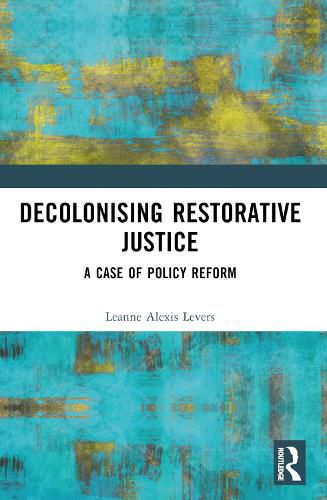Readings Newsletter
Become a Readings Member to make your shopping experience even easier.
Sign in or sign up for free!
You’re not far away from qualifying for FREE standard shipping within Australia
You’ve qualified for FREE standard shipping within Australia
The cart is loading…






This book critically examines the colonial dimensions of restorative justice through the lens of justice policy reform in Jamaica.
Restorative justice is not new. Practices of restitution can be found throughout history, predominantly in non-Western traditions and religions. One of the key principles of restorative practices is contextualisation. That is, restorative practices are developed and embedded within the political, economic, and cultural context of the communities in which they are practised. Many of the countries that have gone on to develop restorative justice as part of their formal justice system have developed their policy on the model of their indigenous communities - for example, in Canada and in New Zealand. However, with the globalisation of restorative practices within the past decade, many countries have sought to 'colonise' restorative justice, by developing a standardised, best-practice approach. Instead of a practice that is developed and formed by its community, colonised restorative justice dictates that one size fits all. Examined through the lens of the development and implementation of restorative justice policies in Jamaica, this book argues that this Westernised approach diminishes the effectiveness of restorative justice in its capacity: to address the victim's needs; to hold the offender accountable in a way that reintegrates them into society; and to empower the community by involving them in the provision of justice to victims. Restorative justice, then, must be decolonised -and local, indigenous practices acknowledged -if it is to achieve its aims.
This book will be of interest to a range of scholars with interests in decolonisation, as well as alternative dispute resolution, especially those in sociolegal studies, criminology, human rights, social policy, political science, and Caribbean studies.
$9.00 standard shipping within Australia
FREE standard shipping within Australia for orders over $100.00
Express & International shipping calculated at checkout
This book critically examines the colonial dimensions of restorative justice through the lens of justice policy reform in Jamaica.
Restorative justice is not new. Practices of restitution can be found throughout history, predominantly in non-Western traditions and religions. One of the key principles of restorative practices is contextualisation. That is, restorative practices are developed and embedded within the political, economic, and cultural context of the communities in which they are practised. Many of the countries that have gone on to develop restorative justice as part of their formal justice system have developed their policy on the model of their indigenous communities - for example, in Canada and in New Zealand. However, with the globalisation of restorative practices within the past decade, many countries have sought to 'colonise' restorative justice, by developing a standardised, best-practice approach. Instead of a practice that is developed and formed by its community, colonised restorative justice dictates that one size fits all. Examined through the lens of the development and implementation of restorative justice policies in Jamaica, this book argues that this Westernised approach diminishes the effectiveness of restorative justice in its capacity: to address the victim's needs; to hold the offender accountable in a way that reintegrates them into society; and to empower the community by involving them in the provision of justice to victims. Restorative justice, then, must be decolonised -and local, indigenous practices acknowledged -if it is to achieve its aims.
This book will be of interest to a range of scholars with interests in decolonisation, as well as alternative dispute resolution, especially those in sociolegal studies, criminology, human rights, social policy, political science, and Caribbean studies.